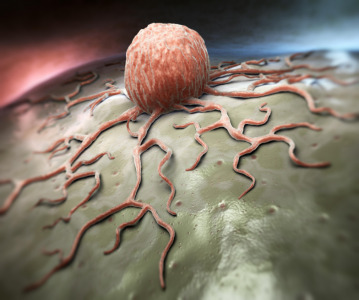Gut instinct: molecular link between COVID-19 and serotonin cells in the gut
.png)
New research may provide further evidence of the gut’s role in SARS-CoV-2 infection and disease severity with a molecular link between serotonin-producing cells in the gut and COVID-19 disease severity.
Researchers at Flinders University, Adelaide, Australia, have demonstrated a potential molecular link between COVID-19 and serotonin cells in the gut, suggesting that gut health may have a role to play in driving COVID-19 infection.
The collaborative study investigated gene expression amongst various different cell types lining the gut wall, sequencing and analysing whole genomes from thousands of individuals cells within the intestine. Specialised cells in the gut that synthesised and released serotonin were also discovered to possess a highly enriched expression of a specific SARS-CoV-2 receptor, and were the only type of cells to express all genes associated with COVID-19.
The research may provide further insight into what drives COVID-19 infection and disease severity, potentially supporting previous evidence suggesting antidepressants known as selective serotonin reuptake inhibitors could reduce the severity of COVID-19 symptoms after infection.
Damien Keating, professor and Deputy Director of the Flinders Health and Medical Research Institute and Head of the Gut Sensory Systems research group, commented: “Our study endeavoured to understand whether the gut could be a site of disease transmission and what genes might be associated with the virus entering the cells lining the gut wall.” As the exact site of infection and primary drivers of COVID-19 severity are yet to be fully understood, the researchers behind this study hope to provide important information on the gut’s role in the virus. “Our study adds further evidence that COVID-19 is far more likely to infect cells in the gut and increase serotonin levels through direct effects on the specific gut cells, potentially worsening disease outcomes,” added Keating. “As COVID-19 continues to circulate, further research will be required to advance our understanding of the gut’s role in the virus and continue to find treatment options to work alongside vaccinations.”
The study was published in leading gastrointestinal research journal Gut.
Want to know more about the gut and how it affects overall health? Read our Consumer health trends webinar roundup on the gut microbiome, or watch the webinar itself on-demand.
Source: How the gut may help to drive COVID-19 – News (flinders.edu.au)
Related News
-
News mRNA therapy for ovarian cancer and muscle wasting
Researchers demonstrate results of a promising mRNA therapy for ovarian cancer and muscle wasting caused by cachexia, a condition associated with various types of cancers and chronic diseases. -
News Pfizer CentreOne Content Refinement Q3 media buy
For 40 years Pfizer CentreOne has been guiding drug projects to success. Here’s how our services make us an altogether different kind of CDMO: -
News Bora Pharmaceuticals expands development and manufacturing capacity with landmark acquisition
Taiwan-based CDMO Bora Pharmaceuticals have acquired niche generic drugs developer TWi Pharmaceuticals, expanding their outsourced development and manufacturing services with two additional manufacturing facilities. -
News Lonza and Touchlight collaboration to bring expanded end-to-end mRNA offerings
Through a collaboration with biotech company Touchlight, Lonza is set to expand their end-to-end offering for mRNA manufacturing with additional DNA raw material sources, including Touchlight’s doggybone DNA. -
News Oxford University presents promising phase II data for malaria vaccine
The malaria vaccine R21/Matrix-M, developed by researchers at Oxford University, has produced encouraging new data for the global effort against the mosquito-borne disease. -
News NextPharma to acquire Norway manufacturing site from Takeda
Biopharmaceutical company Takeda and CDMO NextPharma have announced an acquisition agreement in which Takeda will divest from their Asker, Norway manufacturing site, set to be acquired by NextPharma. -
News Novavax COVID-19 vaccine receives backing from European Medicines Agency
The European Medicines Agency has backed the Nuvaxovid COVID-19 vaccine for adults as a booster shot to other COVID-19 vaccines. -
News First treatment for Acid Sphingomyelinase Deficiency approved by US FDA
Enzyme replacement therapeutic Xenpozyme has received US FDA approval with an orphan drug designation to treat symptoms of Acid Sphingomyelinase Deficiency, a rare genetic disease.
Position your company at the heart of the global Pharma industry with a CPHI Online membership
-
Your products and solutions visible to thousands of visitors within the largest Pharma marketplace
-
Generate high-quality, engaged leads for your business, all year round
-
Promote your business as the industry’s thought-leader by hosting your reports, brochures and videos within your profile
-
Your company’s profile boosted at all participating CPHI events
-
An easy-to-use platform with a detailed dashboard showing your leads and performance


.png)
.png)
.png)

.png)
.png)